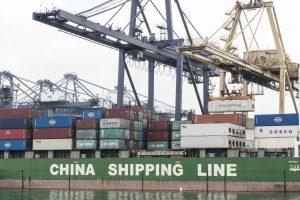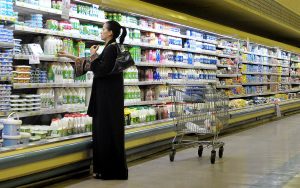São Paulo – Foreign trade in Brazil and the world over will take a major hit from the coronavirus crisis. However, the impact will not be even across all industries. So says Brazilian Foreign Trade Association (AEB) chairman José Augusto de Castro, who spoke with ANBA this Wednesday (18). He believes the impact on international shipping of food items might not be as severe as with other industries.
“Theoretically speaking, food items wouldn’t be as affected, because they are staples. People still need to eat in spite of the crisis. But they are also impacted,” says Castro. Logistics will be one of the challenges to regular trade flows. “An industry that might otherwise be working well will be affected by other activities,” he argues, citing problems at seaports around the world.

Food products such as meats, soy, maize and sugar are exactly the cornerstones of exports from Brazil to the Arab countries. Iron ore is also a best-seller. “These are products that you load onto a ship which departs from Brazil fully loaded and arrives at the destination fully loaded. In theory, the logistics is simpler. Apart from meat, these items do not require refrigeration, and even a ship carrying meat can stop at a port with enough power outlets to keep the containers chilled,” says Castro.
According to him, a major issue in Chinese ports these days is that there are no outlets. Therefore, the product needs to be kept in refrigerated shipping containers aboard the ships, and this entails high costs as long as ships stay docked at the port. “Someone is taking on that cost,” he says. But considering the profile of exports, Castro believes Brazil’s trade with Arab countries will not struggle as badly as that with China and the US, for instance.
For the time being, it’s still business as usual in Brazil’s agribusiness industry, which underpins food trade, but a distribution system is also required in order for the product to reach its buyers abroad, where much of the demand is. José Augusto de Castro notes that Brazil’s annual food output is 240 million tons, and crops don’t ship out entirely upon harvest – some of it is stored and then distributed via seaports throughout the year. “At that point, it’s no longer about production; it’s about logistics,” he says.

Aside from ships docked at ports because buyers won’t unload the cargo due to weak demand and inability to store, leading to port congestion, there’s also the coronavirus’ potential impact on the labor force. This Wednesday (18), workers at the Port of Santos were threatening to go on strike. “It compounds a scenario that’s already bad,” he says. The same can happen in other countries due to fear of contagion. “A ship’s crew members are really highly likely to contaminate other people,” argues Castro.
Besides logistics, foreign trade will also take a hit in case industry output slows down. Early this month, Brazil’s National Motor Vehicle Manufacturers Association (ANFAVEA) said production might decrease due to a shortage of Chinese-made parts. “It’s a conjunction of factors,” says Castro regarding the potential impact of coronavirus on Brazilian trade. “However, in the case of Brazil, production hasn’t been affected yet,” he says.
Even though he expects the impact on food trade to be milder than elsewhere, the AEB’s chairman believes shortages are less likely in agricultural countries. “A market where access to food isn’t as easy will suffer in case exporters fail to address logistical issues and get the cargo in,” he explains. Still, he points out that producing countries like Brazil need to export. “Brazil has a big output, but it has to ship it abroad, because domestic demand isn’t enough, no matter how much consumption goes up,” he says.

Most Arab countries, especially in the Gulf, are dependent on food imports, and Brazil is a major supplier. At this time, some Arab economies are getting ready to live on less oil money, since prices slid almost 50% in the last few days. “As oil prices go down, Arab countries may also tend toward curbing demand, because oil export revenues will decrease greatly,” he says. Nevertheless, eventual cuts in imports are expected to happen in industries not as crucial as foods.
But even if the amount of food exported doesn’t drop as much as in other industries, revenues are likely to be much weaker, since weakening demand is causing prices to drop. This means less cash coming into Brazil from farm product exports. Lower prices for other commodities, such as oil, also impacts the Brazilian trade balance, since the country both exports and imports some types of oil and oil products.
“We are unable to quantify it at this point, because we’re seeing a major change. The impact will surely be very great, but there’s no quantifying it,” Castro says. He explains that commodities account for 65% of exports from Brazil, and notes that prices and shipped volumes have already changed for oil, ores and soy. “I am mentioning just three items exported from Brazil to exemplify the impact that we’ll see. Statistics are not portraying this yet, because there’s a lag between fact and statistics, but we’ll surely have a very big impact,” he says.

The AEB chairman believes that March figures will begin to reflect the coronavirus crisis. The first fortnight of the month saw USD 8.6 billion shipped from Brazil, down 5.6% in daily average numbers, but week two alone saw a much sharper downturn at 20%. In terms of currency, exports slid for ore, soy, soya bran, coffee, poultry, earthmoving machinery and devices, aircraft, ethanol, taps, valves and their parts, etc.
Castro explains that right now, it’s hard to get orders on the market due to port congestion, and companies are trying to fast-track their shipping. There’s fear that the situation might worsen. “Companies are trying their best to ship whatever they can fast,” he says. However, there are news of improvement in the Chinese scenario. “Look: if the news that’s coming out is really true, then it seems China is beginning to envision going back to normal,” says Castro, noting that the country accounts for 20% of all global trade.
He believes opportunities will come up for Brazil in today’s foreign trade scenario, although they will be very topical, with importers seeking alternative suppliers in specific cases. Despite his personal view on how coronavirus might impact foreign trade, Castro believes it’s hard to make any predictions. “We have an indication of what might happen. There are no certainties, but unfortunately we know that what’s coming isn’t good. Every economic indicator is weak right now,” he says.
Translated by Gabriel Pomerancblum




